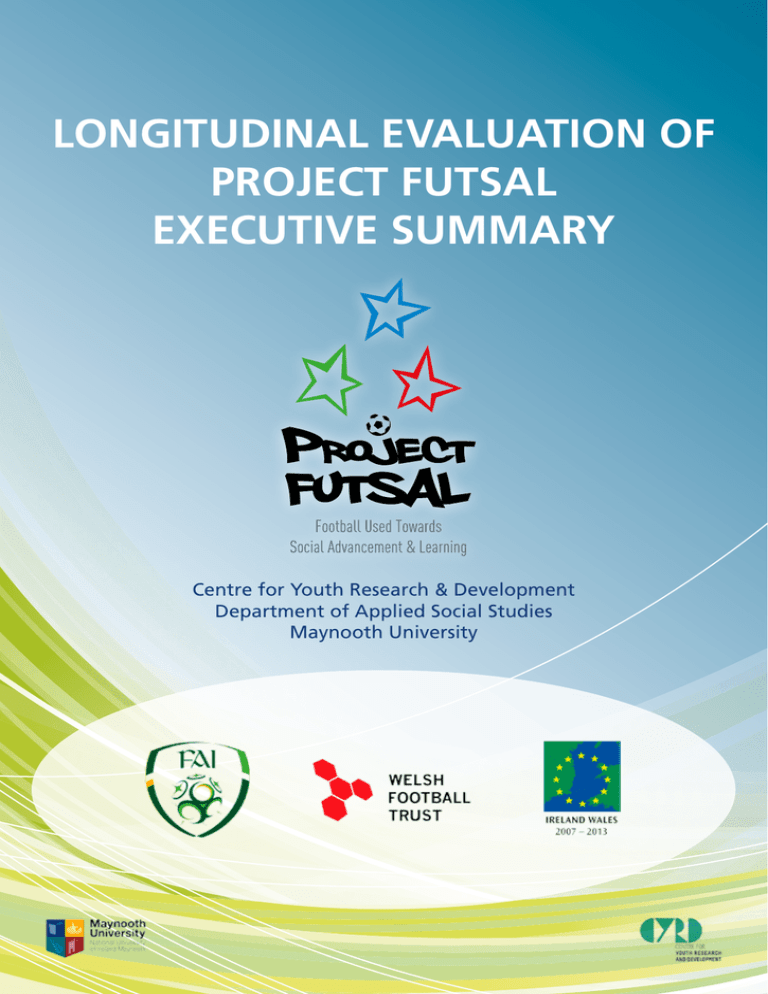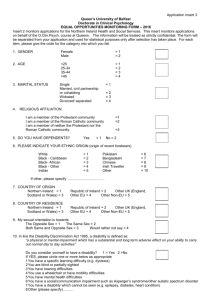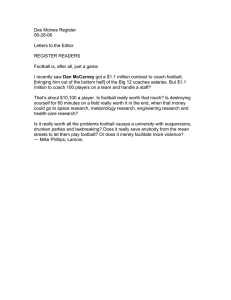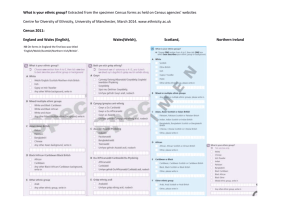
Longitudinal Evaluation of
Project Futsal
Executive Summary
Centre for Youth Research & Development
Department of Applied Social Studies
Maynooth University
Longitudinal Evaluation of Project Futsal
By
Prof. Maurice Devlin, Dr. Nuala Connolly, Dr. Morgan O’Brien, Dr. Kathryn McGarry
Centre for Youth Research and Development,
Department of Applied Social Studies,
Maynooth University.
HOW TO CITE THIS REPORT:
Devlin, M., Connolly, N., O'Brien, M. & McGarry, K.(2014) Longitudinal Evaluation of
Project Futsal. Dublin: Football Association of Ireland.
Copyright Football Association of Ireland (2014). All rights reserved.
Published by Football Association of Ireland (FAI).
Football Association of Ireland (FAI)
Web: www.fai.ie
Executive Summary Introduction Project FUTSAL1 was a cross-­‐national initiative covering multiple sites in diverse settings, delivering an intensive educational programme with a variety of dimensions (personal development, adult education, football coaching) to individuals and communities whose prior experience of structured learning contexts may be limited and perhaps disempowering; while also aiming to encompass a pan-­‐disability dimension in each hub area. Project FUTSAL was a joint initiative between the Football Association of Ireland (FAI) and the Welsh Football Trust (WFT) and secured funding from the European Regional Development Fund’s Inter Reg IVA Ireland Wales Programme 2007-­‐2013 under its theme for the Sustainable Regeneration of Communities. The overall aim of Project FUTSAL was to provide education and work opportunities for people in disadvantaged areas and to empower specific target groups to be involved in the sustainable regeneration of their local communities through employment and volunteerism in the field of sport. The project has run for three years and has seen resources invested in twelve communities by the Ireland Wales Programme, the Football Association of Ireland (FAI) and the Welsh Football Trust (WFT). Project FUTSAL has involved the sharing of best practice between the two associations. It has included the setting up of football education centres (hubs) coordinated by FAI/WFT staff. A structured academic programme of adult education, personal development, football coaching education and work/volunteer placements was offered to participants from the local community at each hub, along with pan-­‐disability training. The target ratio of male to female participants was 50:50, although this proved challenging in practice. The main objectives were to enhance participants’ employability and/or enhance their prospects of going onto further education. Evaluation of Project Futsal The overall aim of the research was to assess the impact of programme intervention on participants and communities in which the project was rolled out. The research also assessed the project’s impact on work opportunities, education and community involvement; while also exploring the extent to which it produced positive social benefits, including value for money. The following key questions were addressed: • Has the project contributed to positive outcomes for participants? • Has the project contributed to community development and regeneration? • What is the effectiveness of the programme, as perceived by the various stakeholders? • What value for money does the intervention provide? 1 Project Futsal -­‐ FUTSAL is an acronym meaning Football Used Towards Social Advancement and Learning. 3 The mixed methods research design included a number of qualitative and quantitative components. Longitudinal data collection included the administration of two separate questionnaires to each participant on site, both at baseline (programme entry) and end point (completion of programme). One of these questionnaires dealt with community and social participation and general wellbeing, while the other focused on physical wellbeing and health. A post-­‐participation questionnaire was also administered by phone. Quantitative data on volunteer hours was also provided by the FAI, allowing for an analysis of community volunteerism. In addition to this, the study also included a series of qualitative focus groups with participants, as well as interviews with hub officers, interns, assistants and associated training staff and tutors. A final component of the research design was the completion of a value for money study. This study focused on one hub, analysing potential savings to the state, and concentrating on two main headings, namely health and employment. Findings 1. Has the project contributed to positive outcomes for participants? A combination of quantitative and qualitative measures provide insight into the ways in which Project FUTSAL has contributed to positive outcomes for participants in both Ireland and Wales, including improved levels of health and fitness and enhanced wellbeing, confidence, self-­‐esteem, motivation and subjective agency. Ireland Longitudinal quantitative findings show increased social and community participation and voluntary activity over time. While 49.6% of participants in the Irish hubs reported helping with or attending activities organised in their local area at least once a week prior to participation, this rose to 69.7% at the end point among the ‘matched’ follow-­‐up sample. In addition, the number of participants actively providing help for other people (excluding work, family or volunteering) within the previous twelve months also increased substantially, from 25.6% at baseline to 42.7% at end point. Further, participants showed an increase in engagement in work for voluntary/charitable organisations. While 34.7% of participants indicated that they participated in work for voluntary or charitable organisations at least once a week at baseline, this figure had increased to 68.9% by end point. Findings also show increased participation in physical activities and satisfaction with general health over time. The overall group reported relatively high levels of satisfaction with their general health at baseline, with 71% stating that they were ‘satisfied’ (49.6%) or ‘very satisfied’ (21.4%). At end point this cumulative figure increased to 85.8% and in particular the number reporting themselves as ‘very satisfied’ with their general health rose from 21.4% to 40%. There was also an improvement in those describing their fitness levels as ‘very good’ -­‐ going from 15.4% to 32.5% -­‐ while conversely, those describing their fitness levels as ‘bad’/’very bad’ decreased from 17.1% to 2.5%. Participants also described improved energy levels between baseline 4 and end point. Those describing their energy levels as either ‘good’ or ‘very good’ had risen from 58.9% to 77.3% by end point. Awards data also highlights the success of the programme in Ireland. With an average of 25 participants commencing in each of the seven hubs, there was a 38.3% full award rate in 2012/2013, and a 33.7% full award rate in 2013/2014, considerably higher than the 2012 national average of 22.7% for full major award achievements by individuals undertaking Level 5-­‐6 awards (ESRI, 2014). Participants were also asked to respond to a series of wellbeing statements (adapted from the European Social Survey) at both the beginning and end of the programme. A positive change was recorded for ten of these statements, with three of these being statistically significant: ⎯ ‘In general, I feel very positive about myself’; ⎯ ‘Most days I feel a sense of achievement from what I do’; ⎯ ‘I like planning and preparing for the future’. Negative changes were recorded for two of the statements, but neither was found to be statistically significant. One significant gender difference was recorded at baseline, with males being more likely to feel ‘positive about themselves’, while three significant gender differences were recorded at end point: female participants were more likely to report their lives as being ‘close to how they would like them to be’ and male participants were more likely to feel ‘optimistic about the future’ and to ‘enjoy learning new things’. These findings point to improved outcomes for Project FUTSAL participants in Ireland, particularly regarding subjective outlook and sense of agency. Wales Welsh participants showed a decrease in ‘meeting socially’ between baseline and end point, with the proportion meeting several times a week with friends, relatives or work colleagues moving from 75% to 65%. This decrease can possibly be explained by participants having less available social time during involvement with Project FUTSAL. While 55% stated that they had helped with or attended activities in their local area at least once a month at baseline, this figure increased to 60% at end point. The number of participants actively providing help for other people at least once a month increased substantially from 30% at baseline to 47.4% at end point. Almost one third of participants (31.6%) indicated that they participated in work for voluntary or charitable organisations at least once a week at baseline, and this decreased marginally to 30% at end point. The lack of improvements in relation to some aspects of social and community participation may well relate to the much shorter duration of the programme in Wales (three months). Those indicating they were ‘satisfied’ or ‘very satisfied’ with their general health increased from 75% at baseline to 80% at end point. Participants’ description of their fitness levels shows relatively little change, with a small decrease of those describing them a ‘good’/’very good’ from 70% at baseline to 65% at end point. There was an increase in those describing their fitness levels as ‘very good’ from 20% to 35%. At 5 baseline, 60% of participants reported engaging in fitness activities ‘frequently’ or ‘very often’, while at end point this cumulative figure was 80%. In particular, those reporting that they did so ‘very often’ increased from 35% to 50%. Participants describing their energy levels as ‘good’ more than doubled from 20% to 50%, although at the same time the proportion describing their energy levels as ‘very good’ fell from 40% to 20%. There were therefore some contrasting findings within the data collected in Wales, although taken as a whole they indicate small increases in community participation and voluntary activity alongside improved levels of participation in fitness activities. Post-­‐Participation Data A post-­‐participation phone survey was administered to 80 participants in Ireland, representing approximately 19% of the overall participants for the three years. While these cannot claim to give a definitive account of participants’ progression pathways, they are consistent with the other positive findings in this study. The figures represent a substantial reduction in the level of unemployment experienced by the respondents prior to participation in Project FUTSAL. While 40% of participants indicated that they had been mostly unemployed in the time since completing the programme, 16.3% had been mostly employed full-­‐time, 17.5% had been mostly employed part-­‐time, and 21.3% had been in further education/training post-­‐participation. Participants also sustained their commitments to voluntary activities post-­‐programme. Of those moving into employment, a range of roles were identified including work in sports and sports sales, general sales, customer service, warehouse work, porter work and internships. Because the post-­‐participation survey was based on a sample of former participants it does not capture the number of graduates who went on to work with the FAI as interns. This was a significant proportion. In year one of the programme (2011/2012), 18 graduates were recruited by the FAI as interns. In year two (2012/2013), this figure rose to 30 graduates, with 14 interns recruited from the year three graduates (2013/2014).
Participants indicated a high level of agreement that their participation in Project FUTSAL helped prepare them for employment, improved their long-­‐term career prospects, improved their coaching skills and prepared them for further education/training. Almost all (95%) said they would recommend Project FUTSAL to others. Overall, Project FUTSAL has contributed to positive outcomes for participants in both Ireland and Wales. These outcomes include improved levels of health and fitness; and improved wellbeing, confidence, self-­‐esteem, motivation and subjective agency. The value of the programme extends beyond direct employment outcomes to success in engaging participants, enhancing personal development pathways including advancement to further education, contributing to an improved sense of agency and improved perceptions of employability in the longer term. 2. Has the project contributed to community development and regeneration? Volunteering has played a key role in the delivery of Project FUTSAL across Ireland and Wales, contributing to community engagement as well as individual development for 6 participants. Staff and participants across all hubs were enthusiastic about volunteerism and committing to volunteer activities in the community. Data provided above regarding outcomes for Ireland indicates that participants’ engagement with voluntary work increased from 34.7% at to 68.9% by end point. Post-­‐participation data also shows sustained voluntary activity post-­‐programme. On the other hand, data for Wales showed little change over the (shorter) duration of the programme. Data on hours committed to volunteering collected centrally by the FAI indicate a cumulative total of 22,470 volunteering hours for the 2012/2013 academic year across all hubs in Ireland, benefitting a total of 61,269 participants. Corresponding data from Wales showed a commitment of 6762 volunteer hours, benefitting a total of 3,254 participants. The types of activities undertaken in Ireland varied, including volunteering in schools, clubs and with disability groups as part of work experience for the programme, in addition to working with the Late Night Leagues2 and match volunteering. Longitudinal data collected from participant surveys shows increased frequency in participation in voluntary activities from baseline to end point. In Wales, volunteerism is incorporated through football camps, futsal tournaments, a range of sports days and also match and stadia support. The pan-­‐disability element of Project FUTSAL contributed to community development by engaging the participants in related coaching and training and through the organisation of local events, creating a resource for local clubs wishing to engage in pan-­‐
disability football. A planned element of Project FUTSAL from the outset was the setting up pan-­‐disability football teams in the hubs, with a view to encouraging and assisting local communities to support the delivery of football to a wider range of players with disabilities in their communities. The model drew on shared learnings from the Welsh Football Trust model of community-­‐based pan-­‐disability football teams. Regular engagement between officers in the FAI and the Welsh Football Trust (WFT) during the course of Project FUTSAL enabled the sharing of ideas, contributing to the development of the pan-­‐disability component of the project. Visits made to view the Welsh programme by the FAI Football for All coordinator enabled liaison with WFT officials, local pan-­‐disability clubs and parents of players involved, with a view to progressing and sustaining the pan-­‐disability programme. While the pan-­‐disability teams themselves were not established, there were a range of very valuable related outcomes. Project participants in Ireland were trained to deliver pan-­‐disability football sessions, and hub participants were linked with local football clubs which developed pan-­‐disability football programmes and provided regular coaching sessions. Feedback relating to disability elements of the programme was very positive, with staff reporting the experiences as beneficial for participants and participants reporting encouraging experiences working with people with disabilities. In addition to outcomes in relation to employment, employability and progression to further education, Project FUTSAL has actively promoted volunteerism as a means of community development and regeneration. In addition, the pan-­‐disability training has created a resource for local clubs wishing to engage in pan-­‐disability football. These elements of the project have been of 2
The Late Night Leagues are a diversionary programme incorporating soccer leagues at various locations across Dublin, aimed at encouraging at risk young people to participate in meaningful activities. 7 mutual benefit to participants and to schools, clubs and the local communities in which the hubs were based. 3. What is the effectiveness of the programme, as perceived by the various stakeholders? Ireland Participants emphasized the value of the programme as a ‘stepping stone’, contributing to personal development pathways by providing improved confidence and motivation. Students reflected that while it may not lead to direct employment, it may facilitate progression to further education or new opportunities. In Ireland, the development officers, educational providers and local authorities reported positive working relationships. Equally, development officers also indicated an overall positive view of the work of the tutors. The addition of interns in the second year of hubs was described as particularly useful by officers and participants, providing additional organizational support to the programme, but also encouragement to current students. Participants were largely satisfied with programme content in Ireland. Staff and students typically reported positive experiences of volunteering and disability football training and events. ‘The way the course was run, the education part of it, everything was just absolutely perfect for me. I just want to push this as far as I can, and obviously it is just a dream that something comes out of this at the end.’ ‘It’s win-­‐win, the schools are getting great training, the kids are getting great training, the coaches are getting great confidence going in there.’ Participants drew positive comparisons to other experiences of education, describing their enthusiasm for the subject, the support of staff and their relationship with educational providers as important. It is clear that the adult education approach was successful in this regard. It is also clear that football was an important contributing factor to participants joining and continuing with Project FUTSAL. Some challenges presented in Ireland. Officers found time management a challenge, with many balancing competing workloads and commitments, but most thought that this improved after the ‘bedding down’ period of the first year. Staff in Ireland were generally satisfied with the support provided by the FAI. ‘We were very apprehensive last time round but we’ve found it easier this time. The FAI have respect for the fact that it takes more than the number of hours allocated.’ In some cases, participants expressed concern over access to social welfare payments, and in the rural hub, travel was an issue, though this mostly related to the location of the hub and the distance travelled. Achieving the gender quota was also challenging in Ireland, with the urban hubs being more successful. Respondents made it clear that that female participants were actively targeted but with less success than hoped. It is anticipated that more recent initiatives and an overall growth in girls’ and women’s football will contribute to improved levels of participation in this context in the future. It was found that where female participants joined, they had a particularly keen interest in football. 8 The commitment of the ETB and FAI staff was highlighted as particularly important in retaining participants. While drop-­‐off was an issue in a minority of cases, many participants who left did so because other positive opportunities arose. Generally, staff were satisfied with attendance and participation. ‘The attendance was good. I mean there was a core group that would attend every single class and then there was a few that would jump in and out. But I mean you are going to get that across the board anyway.’ Wales Participants in Wales entered the programme with relatively low levels of formal educational attainment compared to the Irish cohort. Accordingly, they undertook Essential Skills educational components focusing on literacy and numeracy. Some participants in Wales were less motivated to participate in these Essential Skills components, but were more enthusiastic about the football and coaching elements of the course, again highlighting the value of football as a means of engagement. Students and staff reported positive experiences of volunteering and disability football training and events. ‘One of the best things about it was meeting people, being friends and then getting to do activities and tournaments.’ ‘Once they finish the course, they will have a link with the club, you build a relationship with them, they want to be involved and to volunteer...There is an ethos of not just the course has ended, but getting involved.’ Participants in Wales also drew positive comparisons with other previous experiences of education. While the officers and hub assistants described positive working relationships with the individual tutors, some organizational and management issues with the colleges were present. Staff reported that improved support and involvement from the local clubs and the Welsh Football Trust would have been beneficial in the overall running and management of the project. Meeting the gender quota was also a difficulty across all hubs in Wales. Participants were also particularly concerned about travel and transport costs, possibly a reflection of the lower rates of social welfare payments. It is also of note that some participants were less enthusiastic about their prospects after the programme, with some indicating that ‘there are no paid opportunities’ for graduates and that at the end of the programme ‘there is nothing’. Participants also expressed concern that while they grew ‘more confident’ throughout the duration of the programme, this may not be sustained. ‘It has been an issue, especially with travel costs with buses because in this hub, none of them have their own transport.’ Staff provided reasons why some participants failed to complete the course, reporting that for some the course wasn’t suitable and for others alternative commitments were an issue, and ‘of course we’ve had a few who have dropped out’. The different structure, 9 content and pacing of the programme in Wales has undoubtedly contributed to different perceptions of Project FUTSAL. 4. What value for money does the intervention provide? A value-­‐for-­‐money study was conducted by Ms Eilís Lawlor of Just Economics to assess the potential economic benefits of the programme. Firstly, employment benefits have significant economic impact in terms of both the improved financial wellbeing of participants and the potential cost savings for the state. Secondly, the health outcomes that have been demonstrated through the primary research indicate improvements in physical wellbeing that can deliver long-­‐term economic value. Accordingly, three economically-­‐based outcomes have been identified: increased employment salary, lowered levels of unemployment and a benefit to the state in terms of increased taxes and reduced benefits. Three non-­‐economic outcomes have also been included: impacts on physical health; mental health; and crime. Calculations were made using a benefit period of seven years and including anticipated benefits along with a small number of possible negative outcomes. Utilising the values attributed to the identified economic and social outcomes and projecting over seven years, the annual saving is approximately €12,374 per participant. In relation to health outcomes, participant data indicates an overall increased level of exercise/fitness activities, albeit with a relatively high baseline figure; this points to lower levels of health risks for participants over time. Using national data on the development of cardio-­‐vascular diseases, whereby 30% of the population are at risk, and based on research findings regarding the reduction in risk of CVD that can be brought about by improved fitness, it is estimated that the annual saving per incident avoided is €1,575. These figures represent potential public expenditure savings for individuals participating in Project FUTSAL, providing additional endorsement of the significance and value of the programme in contributing to a range of positive outcomes for participants and the state. Strengths Based on the findings of this research, it is possible to identify a number of strengths of Project FUTSAL: • Project FUTSAL has contributed to positive outcomes for participants in both Ireland and Wales. There is statistical evidence of such outcomes including improved levels of health and fitness in addition to improved confidence, self-­‐
esteem, motivation and subjective agency. Overall, these findings signify improved wellbeing for participants. • Whilst there is value in the programme in creating direct employment for participants, it is particularly strong in engaging participants, contributing to the opening up of personal development pathways including advancement to further education, contributing to improved agency and improved employability in the longer term. • The volunteer dimension of the programme has made a valuable contribution to community development and regeneration. 10 •
•
•
•
•
•
•
•
The commitment to pan-­‐disability training has created a resource for local clubs wishing to engage in pan-­‐disability football. Football was particularly successful as a ‘hook’ in attracting and retaining students across Project FUTSAL hubs, highlighting the importance of sports-­‐
based programmes in promoting social inclusion and participation in education. Positive working relationships with education providers and local authorities contributed significantly to the success of Project FUTSAL in Ireland. The commitment of project staff is another key factor. The adult education approach taken in the project has been successful, with participants reporting that Project FUTSAL compared favourably with other experiences of education. Project FUTSAL represents value for money, in that its positive outcomes can be assessed as representing potential public expenditure savings. The cross-­‐national collaborative approach to Project FUTSAL enabled opportunities for shared learning, creating the potential to inform adult education and sports inclusion policy at a local and national level in both Ireland and Wales. Project FUTSAL has provided participants with very positive subjective experiences. Almost all participants surveyed post-­‐programme in Ireland (95%) would recommend the project. The integration of an evaluation study into the project has contributed to a growing body of research on sport and social inclusion. The research contributes empirical data which is of value in the policy context, in Ireland and Wales and further afield. Challenges A number of challenges have been identified during the research, highlighting opportunities for learning for future sports inclusion programmes: • Officers in Ireland found time management a challenge, with many balancing competing workloads and commitments, although they spoke in positive terms about support from the FAI. It is clear that programme interns provided additional valuable support in this regard. • Staff in Wales were committed to the programme but expressed some concern over the resources and support provided by the Welsh Football Trust. Some of these difficulties may have had an impact on participant outcomes. • The structure, content and pacing of the programme in Wales differed significantly from the programme in Ireland. While this makes a direct comparison difficult, the shorter duration of the programme in Wales may have contributed to less positive outcomes for participants, in addition to less optimism in relation to post-­‐participation pathways. • The programme in Wales was designed to meet the needs of participants with lower prior levels of formal education, as evidenced by the inclusion of Essential Skills educational components focusing on literacy and numeracy. Some participants in Wales were less motivated to participate in these Essential Skills components. • While participants across hubs expressed concern in relation to travel and transport, this was a particular issue for those attending rural hubs in Ireland 11 •
•
•
and Wales, and may have contributed to drop-­‐off rates and reduced levels of participation by those affected. The question of reaching ‘saturation point’ of potential participants was an issue in less-­‐populated rural hubs, which would have implications for sustainability. Achieving the intended gender balance was a challenge in both Ireland and Wales, with the urban hubs more successful in this regard. While male participants were more inclined to respond to general advertising, female participation was often encouraged through personal contact with staff. It is anticipated that improved initiatives relating to girls’ and women’s football could contribute to improved levels of participation in the future. The administration of the research required ongoing organisational support from all staff in Ireland and Wales. It is important that staff have an understanding of the research process and the value of the research within the context of the overall work of the organisation. Recommendations Based on the strengths and challenges identified here, the following recommendations can be made: • The FAI should build on the strong relationships it has established with education providers with a view to the continuation of Project FUTSAL or similar sports-­‐based education programmes. • The current policy context, in both Ireland and Wales and in relation to both sports development and to youth provision, favours an increased emphasis on collaboration, interagency and inter-­‐professional initiatives and the project partners could fruitfully seek out further opportunities in this respect. • This research has found examples of good practice in formalising relationships, roles and responsibilities between partners at local level which could be used as the basis for common approaches in future programmes. • The Football Association of Ireland and the Welsh Football Trust should continue to strengthen their commitment to inclusiveness through the provision of pan-­‐
disability training and other initiatives that will benefit people with disabilities. • Future programmes should aim at an enhanced gender balance through proactive and timely steps to address the challenges identified by participants and staff in this research. • This research confirms that, provided adequate resources and supports are in place, programmes with a longer duration are generally more likely to be able to facilitate positive outcomes than shorter ones. • The commitment to volunteering, through Project FUTSAL and otherwise, should be sustained as a contribution to community development as well as to local grassroots football. • Building on the positive shared learning from this project, the Football Association of Ireland and the Welsh Football Trust should continue to consider and promote the benefits of local, national and cross-­‐national collaborative practice. • The effectiveness of sport, and particularly football, as a means of engaging (or re-­‐engaging) ‘non-­‐traditional learners’ with education and training systems merits further attention and action by all those concerned with facilitating and supporting young people’s transitions. 12 Based on analysis of an extensive body of data collected during the longitudinal evaluation of Project FUTSAL, it can confidently be concluded that the programme has contributed to positive outcomes for participants and communities. 13





